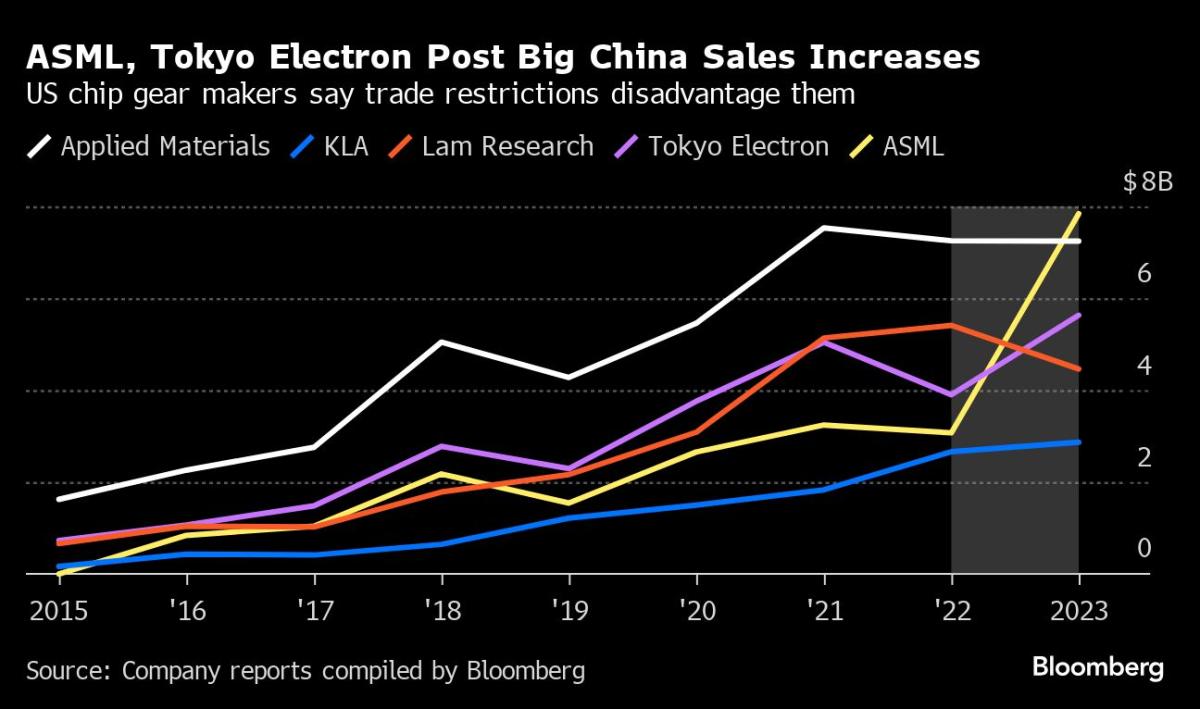
(Bloomberg) — Key US lawmakers are pressing the Biden administration to block Huawei Technologies Co. suppliers from buying American chipmaking gear, escalating efforts to prevent the sanctioned Chinese telecom giant from making progress on semiconductor manufacturing.
Most Read from Bloomberg
The top Republican and Democrat on the House China Select Committee outlined their concerns in a letter Wednesday to Commerce Secretary Gina Raimondo, whose agency oversees a pivotal trade restriction list as well as broader export controls on advanced chips and manufacturing tools. They pointed to Chinese companies Pengxinxu, SwaySure Technology, Qingdao Si’En and “potentially many others” as likely members of Huawei’s “clandestine network,” citing Bloomberg reporting.
The US and its allies have broadly blocked sales of the most advanced chips and manufacturing gear to China, including from three American firms — Applied Materials Inc., Lam Research Corp. and KLA Corp. — as well as Dutch lithography system maker ASML Holding NV and Japanese toolmaker Tokyo Electron Ltd.
Washington has also imposed additional sanctions on a host of Chinese companies, including Huawei and Shanghai-based partner Semiconductor Manufacturing International Corp., that bar purchases of American technology without a US government license. Chinese companies not on the so-called entity list can still access fairly mature chip equipment without Washington’s approval.
“We must continue in our efforts to deny Huawei, and similar firms, the ability to access US technology,” wrote Committee Chairman John Moolenaar, a Republican, and Ranking Member Raja Krishnamoorthi, a Democrat. Failing in that effort would only benefit a small number of US chip tool companies “at the expense of chipmakers worldwide who cannot sell their chips, undermining the intent of the Huawei listing, and harm our national security,” they said.
A Commerce Department spokesperson said they “have received the letter and will respond through the appropriate channels.”
The goal of the US-led campaign is to prevent China from developing a cutting-edge semiconductor industry that could benefit its military. Washington is particularly focused on Huawei, which unveiled a smartphone last year that was powered by an advanced 7-nanometer chip from SMIC. The processor was widely considered a major breakthrough that was difficult to achieve given existing technology curbs, prompting calls for further restrictions and a US government probe.
Since then, the Commerce Department has revoked licenses that had allowed American chipmakers to sell to Huawei — a step the lawmakers applauded in their missive Wednesday — and officials have been weighing additional sanctions on specific Huawei suppliers, including some of the companies named in the letter. A more recent proposal would add more than 120 Chinese companies to the entity list and impose fresh curbs on chip and tool sales to China — but with a carve-out for key allies.
That has set off alarm bells for chip equipment companies, which all view the world’s second-largest economy as a crucial market. ASML sees China accounting for 20% of total revenue next year, Chief Financial Officer Roger Dassen said Wednesday, while noting that the firm is taking a “cautious view” due to the possibility of further regulations.
US companies, meanwhile, have been lobbying hard against any additional measures from Washington without comparable steps from Japan and the Netherlands. They’ve argued that further unilateral controls would be devastating for American industry while allowing foreign competitors to gain ground in China.
US officials tried a hardball negotiating tactic this summer to get allies on board: warning that they could directly curb the China sales of foreign companies, a step seen abroad as a draconian overreach. But allies are largely uninterested in meeting the chip control demands of a presidential administration that will leave office in January. Japan in particular fears retaliation from China should it follow Washington’s wishes.
The lawmakers expressed concern that “drawn-out negotiations” have let Huawei stockpile chip tools needed to rebuild its supply chains. Cutting off Huawei suppliers from that gear would “demonstrate to our allies and partners the seriousness and fairness with which the US government executes its export control policy,” they wrote.
Most Read from Bloomberg Businessweek
©2024 Bloomberg L.P.
EMEA Tribune is not involved in this news article, it is taken from our partners and or from the News Agencies. Copyright and Credit go to the News Agencies, email news@emeatribune.com Follow our WhatsApp verified Channel


